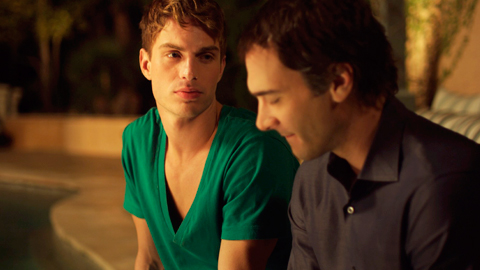 As a writer and director, Casper Andreas has highlighted the lighter side of being gay in films such as A Four Letter Word, Slutty Summer, and most recently 2010’s Violet Tendencies. His latest written and directed by project, Going Down in LA-LA Land, showcases a darker side of the rainbow, in which its main character, Adam (Matthew Ludwinski) is drawn into the world of pornography, drugs and prostitution when he takes up residency in the City of Angels, and tries to eek out an existence as a full-time actor.
As a writer and director, Casper Andreas has highlighted the lighter side of being gay in films such as A Four Letter Word, Slutty Summer, and most recently 2010’s Violet Tendencies. His latest written and directed by project, Going Down in LA-LA Land, showcases a darker side of the rainbow, in which its main character, Adam (Matthew Ludwinski) is drawn into the world of pornography, drugs and prostitution when he takes up residency in the City of Angels, and tries to eek out an existence as a full-time actor.
The film, which is based upon the novel by Andy Zeffer, takes aim at the nature of fame, while serving to highlight Andreas’ own experiences as a triple threat in the entertainment industry, as he also has actor on his resume – minus the pornography, drugs and prostitution portion of the show.
Going Down in LA-LA Land has the distinction of being the opening night film at this year’s FilmOut festival, which runs at the North Park Birch Theatre for two weekends, beginning on Aug. 19 and concluding on Aug. 28.

San Diego LGBT Weekly spoke with Andreas about the life imitating art aspects of his film oeuvre, how LA-LA Land can be viewed as a cautionary tale and what he hopes audiences at FilmOut will get out of his latest endeavor.
San Diego LGBT Weekly: How does being an actor lend itself to your writing and directing process?
Casper Andreas: Having been an actor for many years has helped me a lot, in terms of directing. A lot of directors come from a background of just being a writer, or not having spent a lot of work onset. First-time directors, a lot of the times, can be afraid of the actors, and not really know how to treat the actors.
That’s one of my strong points as a director in that I work really well with actors. I know how to talk to them, because every actor is different, and you have to figure them out and how to do what you need them to do. And I love that being an actor myself; I love that aspect of directing.
In terms of writing, as an actor you learn how to analyze scripts, figure out the beats and I read a lot of scripts before I started writing, both plays and screenplays, and analyze them from an actor’s point-of-view. I think that helps, in terms of having that actor’s background.
Are there any of your films that you would term autobiographical or semi-autographical?
A lot of my films that I’ve written have been inspired by my life or friends’ lives; most of my films have taken place in New York, and being a gay man living in New York myself, it’s very much inspired by that.
Specifically, Slutty Summer was inspired by a time when I had come out of a long-term relationship, and worked at a restaurant for the summer, a lot of the plot in the film is made up, but some of the dialogue certainly was inspired by conversations I’ve had with friends and the basis for the story of the New York gay waiter dealing with dating again was certainly inspired by my life.
Going Down in LA-LA Land I wrote based on a novel, which was inspired by the writer’s own life experiences, but I also related to a lot of things in the book that made me want to make the film; because I also used to live in LA and pursue acting. And being a struggling actor in LA, which is much of what the book and film is about; I related to that and included some of my experiences in the screenplay, as well.
For the most part your films have been comedic aspects of gay life. Was it a difficult transition to undertake with the subject matter of Going Down in LA-LA Land?
It’s true that most of my films have been comedic, but my film Between Love & Goodbye is definitely a drama, it has quite a bit of comedy as well, but it’s definitely more of a drama than any of my films.
With Going Down in LA-LA Land, I think of it more as a dramedy, as there’s certainly drama in it, but there is also a lot of comedy. But, it’s a different kind of comedy, than Violet Tendencies for example, which is more of a sex comedy.
But, as a writer and director, I really wanted to do that; I want to do different things, I don’t just want to do one thing and I want to work in different genres.
Would you term LA-LA Land as a modern-day cautionary tale?
It’s a cautionary tale, absolutely. There are a lot of people with big hopes and dreams moving out to LA every year, probably every day. It’s a city that I have a love/hate relationship with; I lived there myself and struggled as an actor for a few years; it’s a hard thing to even get the type of day jobs that actors in New York get, working as a waiter or whatever. In LA, those jobs are hard to even come by, because everyone’s an actor and everyone‘s looking for those types of jobs.
I found it very hard to even stay afloat living in LA and obviously that is what Adam goes through, as well. And that’s why he ends up doing the things that he’s doing. I also feel like it’s a city where it’s very easy to get caught up in the potential fabulous lifestyle that everyone’s perceived to have out there. And people start feeling bad about themselves with what they don’t have, because you see so much wealth around you, of needing to show off in that city. So, I also think that’s why people change, in terms of finding success and wealth and it becomes the only thing that’s important, and it’s a little scary and the film explores those subjects.
Do you ever feel stereotyped as a “gay writer/director,” or are these merely the stories that you wanted to tell movie audiences?
Well certainly I am seen as a gay filmmaker, well, because I am gay and also the films that I’ve made so far, all my features, have been gay films with gay storylines. I don’t mind necessarily to be described as that.
But I’m totally open for making bigger budget films and reach larger audiences, so I don’t feel like I always want to stay with making films for a gay audience. But, I hope that whatever films I make in the future; I certainly don’t want to make films that portray gay people in a negative light. There are a lot of gay filmmakers who are not making gay films, but are making mainstream films and are able to include gay storylines in various ways, even though the films are not perceived as gay films. So, that’s definitely something that I’m striving for.
What do you hope that audiences come away with from viewing the film?
Well I hope that they’re going to have a good time and enjoy the film. I do hope that, as a cautionary tale, people think about what is most important in their lives. And, like Adam, at some point you have to choose between fame and excess and love; and being a romantic myself, I like the idea of putting love first.
For ticket information and a full schedule of movies slated to be shown at FilmOut, log onto filmoutsandiego.com.












